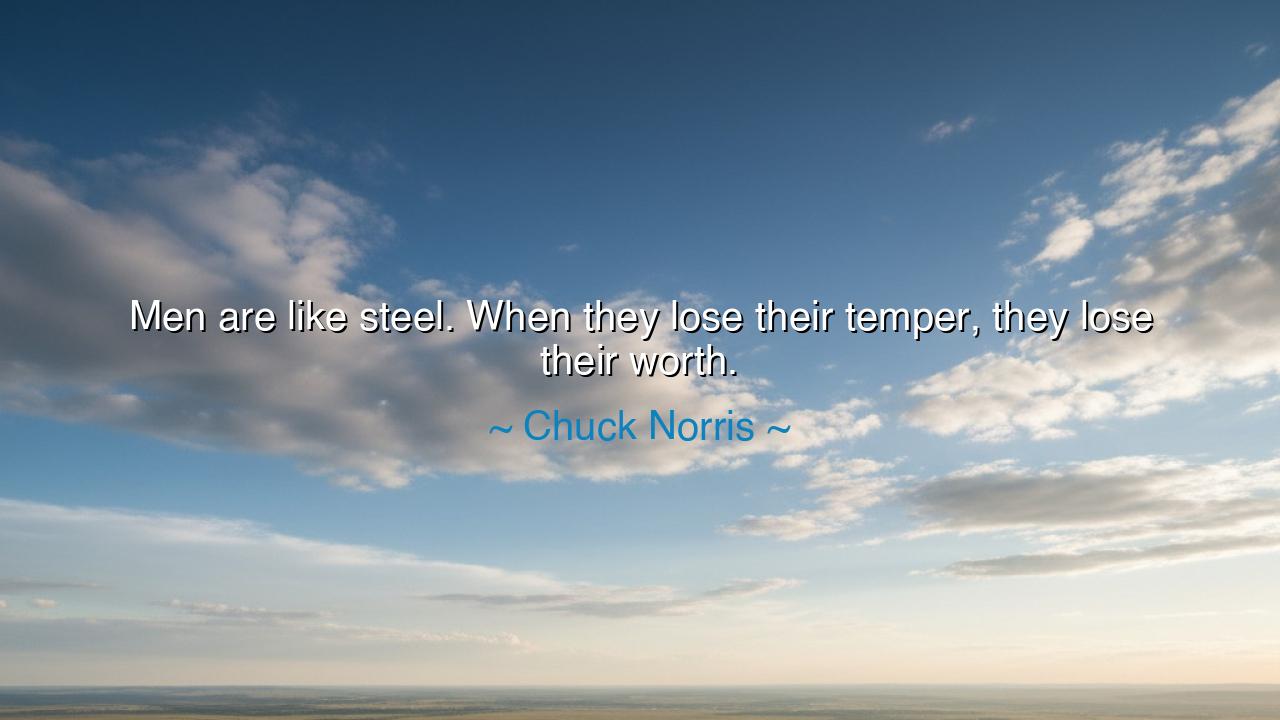
Men are like steel. When they lose their temper, they lose their






When Chuck Norris said, “Men are like steel. When they lose their temper, they lose their worth,” he spoke not merely of physical strength, but of the moral and emotional integrity that defines a man. Norris, a martial artist, actor, and cultural icon, draws an analogy between the resilience of steel and the fortitude of character. Just as steel becomes brittle and weakened under extreme heat or improper treatment, so too does the human spirit lose its strength when surrendered to uncontrolled anger. In these words, he elevates self-mastery above raw power, reminding us that true value lies in the discipline of the heart.
The ancients, too, understood the peril of unchecked passion. Seneca, in his letters to Lucilius, warned that anger is a temporary madness, robbing a man of reason and honor. The Stoics regarded temperance as a pillar of virtue: a man who cannot govern his emotions is as vulnerable as a sword that has been overheated, brittle, and prone to shatter. Norris’ metaphor, vivid and modern, mirrors this age-old wisdom: strength alone is hollow without the guidance of self-control, for anger corrodes the very essence that makes a man admirable.
Anger, unchecked, can undermine the noblest intentions. History is filled with leaders and warriors whose temper led to folly. Alexander the Great, despite his genius, often acted in moments of rage, punishing allies and enemies alike with disproportionate ferocity. In those moments, his strategic brilliance was overshadowed by impulsive wrath, demonstrating that moral fortitude is as essential as physical or intellectual skill. Norris’ observation is a reminder that the temper of the heart determines the enduring value of deeds.
Even in ordinary life, this lesson holds true. A man who loses control in words or actions risks damaging relationships, trust, and reputation. Families are fractured, friendships shattered, and communities destabilized by moments of uncontrolled anger. Just as steel must be tempered to retain its strength, so too must human character be tempered with patience, reflection, and restraint. The measure of a man is revealed not in how fiercely he strikes, but in how calmly he responds when provoked.
Norris’ insight also emphasizes the transformative power of discipline. Martial arts, from which he draws much of his understanding, teach that mastery over the body and mind is inseparable from mastery over emotion. A fighter who succumbs to rage loses clarity, control, and effectiveness. Similarly, in the broader theater of life, a man who cannot govern his anger loses the worth of his wisdom, his influence, and his honor. Strength without self-control is like steel that has been weakened in fire: impressive in appearance but fragile in substance.
Consider the example of Abraham Lincoln, whose leadership during the Civil War was marked by remarkable patience and emotional restraint. Despite facing enormous provocation, insult, and tragedy, he governed with calm deliberation, rarely allowing anger to cloud judgment. In doing so, he preserved the moral authority and enduring respect that history grants him. His example illuminates Norris’ principle: control over temper safeguards a man’s value, even in the most turbulent circumstances.
The lesson is therefore timeless: temper must accompany strength. To cultivate worth, one must practice patience, self-reflection, and measured response. Moments of anger, if unchecked, can undo years of effort, reputation, and achievement. Like steel, the human soul requires careful forging and cooling, resilience and refinement, to maintain its integrity and usefulness.
So, O listener, carry Norris’ wisdom into your own life: when provoked, remember that your worth is revealed not in the heat of anger, but in the steadiness of your response. Temper your emotions as a smith tempers steel, and you will preserve strength, honor, and enduring value. For it is through the mastery of oneself — not through the force of one’s blows — that true greatness is measured and remembered across generations.






AAdministratorAdministrator
Welcome, honored guests. Please leave a comment, we will respond soon